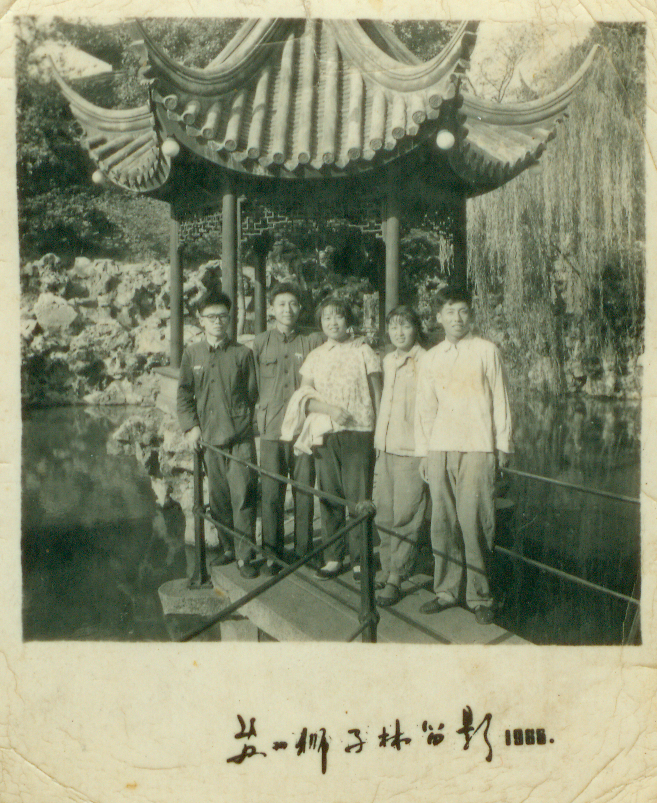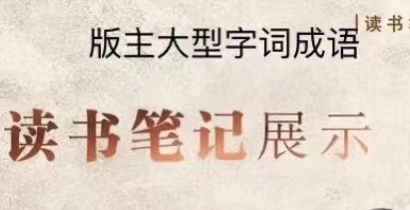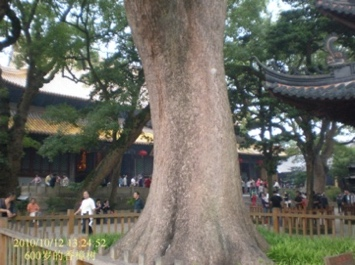I experienced the Cultural Revolution of Nanjing University (NJU) at the very beginning. On the first of June of 1966, the Central Broadcasting Station broadcast a Marxism-Leninism big-character poster by Yuanzhi Nie of Beijing University. On the afternoon of the same day, some of the students of the three arts departments (Chinese, History and Philosophy) in the Liyang branch school of NJU pasted some posters, criticizing Principal Yaming Kuang for obliterating the class struggle in a book. (Note: Liyang is a county of Chagnzhou) Kuang was just in the branch school and he read all the posters written by the students. He pointed to this one and that one, saying that this was a poisonous grass and that was a counter revolutionary. I was just on the site and thought those students who had written the posters would suffer bad luck and be made into rightists as those in 1957. When Kuang’s words had just been completed students of the three departments were assembled and began to criticize those who had written the posters. On the third of June, the critique reached the high tide and every class had meetings to criticize the posters and began to reorganize the thought. But on the afternoon of the same day, the chief of the provincial party committee propaganda department came to our branch school, criticized Kuang and liberated the students who had written the posters. The situation reversed quickly. At 6:30 a.m. of June 4 the central broadcasting station broadcast the news that the students of NJU had uncovered Yaming Kuang. The imposing Revolution broke out in the campus. All the students in the Liyang branch school were carried to the campus in Nanjing. All the southern court was covered with posters criticizing Yaming Kuang and the Communist Party Committee of NJU, the school falling into confusion.
The Provincial Party Committee sent a work team led by the vice secretary of the Committee Chong Peng to NJU. Peng acted as the secretary of NJU Party Committee. It was not long before some students pasted a lot of posters, saying kicking off the work team and making revolution ourselves. There were others (including those who had criticized Kuang and were liberated by the work team) who opposed the view and held that it was important to maintain the work team's prestige. Those students were called new monarchists by those who wanted to drive away the work team (those supporting Kuang in Liyang were called old monarchists). I was somewhat conservative and held it as too far to drive the work team away. Again the situation developed beyond my expectation. When Chong Peng just came back from Beijing, some students of NJU gathered at the Nanjing Railway Station and caught him when he got off the train. Peng was brought to our campus and forced to step in the southern court, surrounded by the student pickets. All other students were walking on the periphery. At the end Peng was forced to express his attitude toward the revolutionary action of the students, and he said that Chairman Mao had criticized the work team of Beijing University, now we were performing big democracy, we should believe in masses in full range, cancel the work-team and you yourselves organized to carry on the revolution. Peng’s statement received applause from the audience.
On about the 20th of June, there appeared a poster with big characters, saying that the students of Xi’an Communication University were suppressed and appealing to all of us to go there to support them. I had such a feeling like a noisy students’ strike before the liberation. How to go there? It was hard to imagine. Some students went to the gate of the Provincial Party Committee and began sit-in demonstration, asking the Committee to support the students’ revolutionary acts. When we had supper, we were told that the students were already gathering in the Xiaguan Railway Station and requiring to get on the train. Our two classmates were also among them. Afraid they were hungry, Canrong Ma and I used food box to bring some cooked rice and vegetables to the station. Entering the hall of the station we saw Xinkuan Wang, our classmate, directing all the students on the site to get on the train in line with a loudspeaker. We asked him to have supper but he didn’t spare a glance. On the contrary, he asked us to go to Xi’an too. Ma and I were very hesitant about it, because we had brought nothing with us. So far away we went and how to live? Wang encouraged us, saying that all of us had nothing with us and we would not starve to death. I had never sat in the train and still remembered that at the end of the first term when we were doing physical labor in a tree farm in the suburb, I heard the whistle sound of the train. I went a long way to the tracks with another classmate who had not seen a train before either. We waited and waited by the tracks and finally saw a freighter, which looked very ugly. We could not wait for a passenger train, afraid of being late for labor, and left the tracks resentfully. Now the passenger train was in front of me and I could get on without paying any money. I couldn’t resist such a temptation, neither could Canrong Ma. So both of us also stood in the line and got on the train for Xi’an.
All the passengers in the train were students of Nanda (NJU) and we were very excited and lively. It was not very long before the news came that someone went to the school to lend money and grain coupons and would take the next train to Xi’an. My worry soon disappeared because I had three classmates of the NCMS in Xi’an Jiaotong University(XJTU). I could lend some clothes from them. It was summer and only vest and short trousers were needed. We got some money and grain coupons after signing our names and began to pay a visit to universities and colleges. Ma and I visited several colleges and universities. We went a long way to Xi’an Foreign Language Institute, whose campus was very small at that time. We attended an assembly to clutch and criticize Lantao Liu, who was the first secretary of the Party Committee of North-west China, making me feeling that the rebellion spirit of Xi’an students surpassed us and the students of all colleges and universities all over China had been mobilized. We spent 4 to 5 days in Xi’an and Ma and I got ready to return to Nanjing. In the Xi’an Railway Station, we read a leaflet of the latest instruction from Chairman Mao, saying that in 1958 food was free of charge and in 1966 you could get free on the train to support the students to perform the revolutionary big establishment of ties. I thought that Mao was too great. The emperors in the Chinese history were afraid of rebellions and tried their best to suppress the rising peasants. On the contrary this leader supported us to revolt. How happy we were living in this era. The Xi’an Station had already carried out the top instruction of Mao and all students who had student identity cards could go anywhere he or she wanted. When we were close to the counter to get the tickets we got to know we could go into any direction. Both of us began to hesitate. We left the line and wandered in the station square. Ma and I were eager to go to Beijing, which was the dream of both of us from the childhood. But we were both members of the leading group of the class and represented the class to send meals to our classmates in the railway station. We were in Xi’an without telling anyone of our class. What did the classmates think of us? If we lost the chance to go to Beijing, would the chance come again in the future? We thought and thought and couldn’t make up our minds. We went to a bar and bought a small bottle of alcohol, drinking and thinking again and again. In the end, Ma was determined to go back to Nanjing and I did not oppose the decision strongly, holding the view that in the future we were sure to have chance to go to Beijing. When we got to NJU we discovered that almost all the students in our class were gone in groups randomly. How regretful we were not to go to Beijing from Xi’an!

Image of Red Guard
Since so many of us had already gone away, I also left Nanjing with some classmates. We first went to Suzhou, living in Jiangsu Normal Institute (later called Suzhou University), reading the posters with big characters and travelling to the botanical gardens as well, such as Sizilin (Lion Garden), Zhuozheng Garden. I had such a feeling as experiencing the life of the Prospect Garden described in the history novel “Dream of Red Mansions (the Story of the Stone)”. We also went to Shanghai and were received by a hotel. For the first time I lived in a luxurious room with a bathtub and a bathroom and could have a soaking-bath before sleeping, free of charge. I had visited almost all top universities of Shanghai, such as Fudan University, Jiaotong University, Tongji University, East China Normal University and Foreign Language Institute.

Touring without Pay during the Cultural Revelution
When I got back to NJU, the first group of students had already gone to Beijing (about on the tenth of Sept.) and the second group would go there for the National Day. Hastily I made registration and waited the day to come. About on the 24th of Sept. I followed other hundreds of students for Beijing by train. In the cars, entertainment activists played the accordion and taught us to sing a song, “We have come to the Tian An Men Square”, an eulogy to the Cultural Revolution launched by Mao. When we got out of the Capital Station, we were picked up by large buses. Coming to the Tian An Men Square, we began to sing the song we’d just learned in the train cars, with the surging emotions and fighting spirit. We were sent to the Research Institute of Dynamics of the Chinese Academy of Science and began to rehearse, preparing to take part in the National Day parades and to see Chairman Mao on the Rostrum of Tian An Men. On the first of Oct. we got up at midnight, rode in a bus and got to the assigned place,with day dawned. We waited and waited until almost 11 o’clock and our troop began to move. At about 1 p.m. when we arrived the Square our parade troop was still in order. However, when we got to the Chang’an Street in front of the Jinshui Bridge, all the students stopped and looked up to the Rostrum, trying to see Chairman Mao, in a state of utter chaos. I had not seen the old man but saw Premier Enlai Zhou in silver-gray Chinese suit, especially conspicuous, who was waving his hand, asking us not to stay. The successor of Mao, Biao Lin was very thin and I recognized him immediately. When we had passed Tian An Men, the broadcast said that Chairman Mao had met with Crown Prince Sihanouk of Cambodia, and I got to understand why I had not seen him on the Rostrum.
After the National Day I visited several universities and institutes in Beijing, such as Beijing University, Qinghua University, Foreign Language Institute, People’s University, Normal University, Second Foreign Language Institute, Language Institute, Industrial University, and Agricultural University and etc. I also paid a visit to scenic spots and historic resorts, touring in the Summer Palace, Beihai Park, and the Golden Mount, which I had been anxious to see from the childhood. It was pity that the Imperial Palace was locked, afraid of the revolutionary act of the Red Guards. I stayed in Beijing almost half a month, thoroughly satisfying my strong aspiration to tour the capital city.
When I got back to Nanjing, it turned colder and colder, but a lot of classmates were still in other places. I talked with some already in Nanjing about what to do next. The Party Central Committee advocated exchanging the revolutionary experiences by traveling on foot, learning from the Red Army. All of us agreed to go to Jinggang Mountain in Jiangxi Province. So we began to prepare and imagined what should be brought with us, completing the material safeguard work. We bought an aluminum pot, getting ready to cook some food in the unpopulated area. When we were about to start off, Canrong Ma suddenly fell ill and needed an operation. How to deal with this problem? We talked about it and decided that we six first march inside our province, getting to our six homes, first to the north and then to the south. We planned that when we got back to the school, Ma would recover from the operation and we could start for Jinggang Mountain together.
Six of us held high the red flag on which was written “Experiencing Wind and Rain Long March Team” and started off: Fengying Hou (female, mentioned in Section 7), Yiqing Zhu (female, later became wife of Canrong Ma), Chuanyue Wang (male) , Xiuzhong Yan (male), Xingliang Wang (male). From Nanjing, we passed Liuhe County, Yizheng, Yangzhou, Baoying, Gaoyou and got to Xiuzhong Yan’s home in Jianhu County. We turned back to the south, passed Dongtai, Hai’an, and arrived at Chuanyue Wang’s home in Rugao County. We took a short cut from Pingchao through Jiangzhao and got to my home. Then we crossed the Yangtze River from Nantong Harbor, got to the Shazhou County City (later called Zhangjiagang City), seeing the elder brother of Xingliang Wang. The next point was Wang’s home. When we got there, Canrong Ma and Guiying Lin came to us. Lin’s parents were in Indonesia and she was an overseas Chinese girl (who would be mentioned again in Section 46). Now our team had 8 members. Yiqing Zhu’s home was in Wu Xi and Fengying Hou’s in Zhenjiang. From Zhenjiang we didn’t go on foot but by train instead. It was already the spring of 1967, many middle school students were also in the train so that it was crowded beyond imagination. All of us climbed in through the train windows and there were people all over the car, on the small tables between the seats, on the luggage racks and even in the toilets. Once one got in, he or she couldn’t move any longer. The luck was that it took us only one and half hours. Distant passengers were sure to compel their urines in their pants.
It was already in March of 1967. The rebels of Shanghai had launched so called “January Revolution” and seized the power of the Party, government, finance and culture. The rebels of Nanjing followed the example of Shanghai and also seized the power from Jiangsu Province, resulting in the fission among them, one school regarding the seizing act as good and the other bad. “Good” in Chinese is “Hao”, so this school was called “Hao Pai” and “Not good at all” in Chi nese “Haogepi”, so the other school was called “P Pai”. All
of us had to decide which school to belong, “Hao” or “P”. Our eight members of the March Team began to have different views, some of us taking part in the activities of “Hao”, some supporting “P” and the others didn’t express their attitude, being above-the-battle school. It was impossible for us to go to Jinggang Mountain together. Although all of us decreased the communication among us, we had never quarreled with each other, never debated and injured our emotions.
The “Hao” and “P” schools had been boisterous and frivolous for a few months, before the Central Party Committee decided to perform the military control. The military control commission came to NJU and a lot of students returned to the school. However, some of the rebels were not satisfied with the military control commission and a big parade against Shiyou Xu broke out in August of 1967, who was the commander of Nanjing Military Area and director of Jiangsu Province Military Control Commission. The situation was developing beyond people’s prediction and the three high-level cadres of the provincial military region in NJU---Liang, Du and Wu---had fissions, resulting again in a state of chaos, which lasted until about in October of 1968, when the worker propaganda team entered NJU and cleaned up and make the class team pure relentlessly with the military representatives. At the beginning, they tried hard to dig out spies of the US, Jiang Kai-Shek and the Soviet revisionism. All those who had ties with Guo Mindang (National Party) before liberation, or studied abroad, became the objects of investigation. Special case teams were founded to examine some of them. Later, they began to grasp present counter-revolutionaries. Those students who were discontented with reality met with disaster. Before we left Nanda, the members of the counter-revolutionary bloc “May 16” were the targets, eliminating the heads of the rebels one by one. (I’ll say something in detail about so called “May 16” counter-revolutionary bloc in Section 13) A name which sounded pleasant was “the classroom of study”. Once you were forced to enter it, your life would face threat. We often heard the bad news from the so called “the classroom of study” that the rebels in them killed themselves by shearing artery, swallowing sleeping pills, jumping from the high buildings. How horrible!
I began to got puzzled and doubt what would happen in the future. When would the end come? You cannot read other books except for papers read by one person and listened by the others and then discussion was required, which almost nobody was interested in. However, nobody dared to express and lazed away day after day
Completed on Dec. 4 of 2008 in Melbourne
Proofreading on Jan 31, 2012 in Chicago
Uploading on Aug 4, 2023 in Xuzhou









